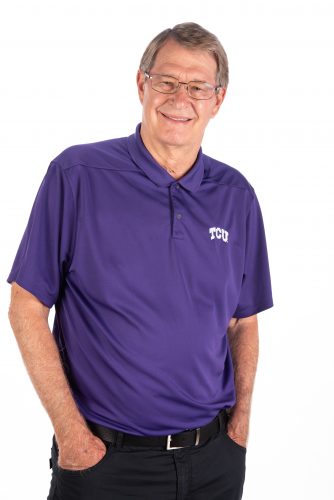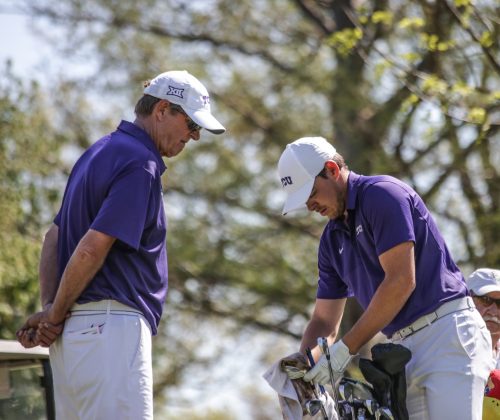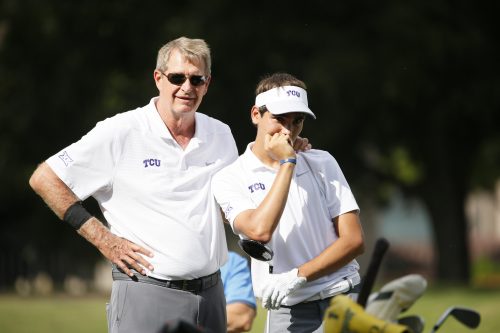
Courtesy of TCU Archives
One Shot at a Time with Bill Montigel
The head men’s golf coach has built a winning program and shaped the characters of hundreds of student-athletes in his long tenure at TCU.
Coach Montigel has been a staple in TCU Athletics since 1979. As head coach of men’s golf, he has taken his team to NCAA regionals for 31 straight years. His postseason run is unparalleled in Horned Frog athletics. Under his leadership, the program has collected eight conference championships and appeared in the NCAA championships 20 times (22 times when including individual bids).
You are in your 35th year as head coach of the TCU men’s golf team. You’ve cycled through so many student-athletes in that time. What has it been like to build and develop a program?
It’s actually been really fun. I’ve been lucky — I’ve had a lot of great players. Watching them come in when they’re freshmen and seeing how they are when they leave, it’s amazing. When they first get here, they don’t really know that much college golf. By the time they leave, it’s completely different.
Many of your athletes have gone on to play professionally. How does it feel to watch that progression?

Golf is more than putts and pars for the head coach of the men’s team: It’s also a test of a patience and character. Photo by Glen E. Ellman
When tour events start, I’m always following the scores. Tom Hoge ’11 is playing on the PGA Tour. J.J. Henry ’98 played on the PGA Tour for 18 years, and he’s getting ready to try to play on the Champions Tour.
It’s also kind of fun following guys that were in college, just at different schools, and how they’re doing on the PGA Tour. Each week there are more than 100 guys out there on the tour. Most of them went to college somewhere. You get to know these guys through the years. You kind of root for them all.
Some go on to coach. Greg Sands ’97 has been the head men’s golf coach at Texas Tech for 20 seasons. Cole Buck ’17 is the assistant men’s golf coach at Stanford.
A lot of the guys go on and do a lot of amazing things — sometimes in the business world or whatever it might be.
We’ve been a pretty close-knit group. We’ve stayed in touch. Their children are now coming to TCU. When these guys came to TCU, they loved it and had such a good experience that they want their child to have that same experience.
What are some indicators that make you feel like a successful coach?
Our goal is to try to be really competitive with the best teams in the country. We’ve been fortunate to have won the conference tournament through the years — I’ve been there eight times, and that’s very exciting.
But I think the relationships I have with most of these guys is the greatest indicator. They come back to TCU and start talking about some of their experiences when they were here. One of them might say, “That was a funnest time we ever had. We went to Hawaii and we went to Costco and we barbecued at night and sat around and told stories.” They all have different memories.
Another indicator is when they come back with their wife and some of their little ones. I don’t know what the rate is, but the majority of the kids who have come to TCU to play golf stayed the entire time and got their degree. That’s very rewarding also. Getting to see them do well in life and really kind of brag about their time at TCU. They’re so passionate about it, they just absolutely love it. They cannot believe that anybody would want to go to any other school.
It sounds like your golfers do the recruiting for you.
Absolutely. I’ve always thought that your players are going to be your best recruiters. Those are the guys that I like listening to the most because they’re going to point out guys who would be a good fit for us or who wouldn’t be.
And TCU kind of sells itself. We have incredible golf courses in town — Colonial, Shady Oaks, Mira Vista, River Crest. We never have practice during a football game; the kids love going to football games. They’re just passionate about TCU.

Bill Montigel watches student-athletes, such as golfer Pierre Mazier, grow up and mature. Courtesy of TCU Athletics
What do you look for when you’re recruiting?
We want somebody who is a good golfer, and that’s our starting point. We want somebody who can help us win championships and compete in the Top 10 in the country. We also want somebody who is a good student who wants to stay the four years and earn a degree. Then I also look for someone composed: While on the golf course, if he makes a bad hole, he puts his club in the bag and goes to the next hole. He’s not throwing his club or cussin’. Every once in a while, there’s a guy who just wouldn’t be a good fit for us because he just can’t control his anger.
We don’t take a guy sight unseen; we watch them a lot. So we know what we’re getting before they get here. This year, we have the best group of guys. I’m so excited. We have a really young team, and they’ve already gotten a lot better. I can see this team really doing some special stuff by the end of the season.
Why are indicators of character so important for you or for the team?
It’s huge because it’s all about having good character. Every time I kind of go against that, it never works. If you get some guy who won’t go to class, or doesn’t want to go to workouts, or is going to act up on the golf course, they’re never going to play as good as the guy who’s doing all the right stuff. Golf is a game of character — they follow the rules, and they call penalties on themselves. Not a lot of golfers are bad people; most of them try to do the right stuff. I think character goes a long way in any sport.
Your athletes are also students and learning to be on their own. How do you try to balance those parts of their lives?
When the guys first get here, we tell them we want them to be self-reliant and make some of their own decisions.
In practice we’re going to tell them that they can do whatever they want. One guy can go play nine holes or 18 holes; another guy can putt for three hours. We try to get them to be self-reliant.
We go on the road, a lot of teams have a curfew, but we don’t have a curfew. We tell them we’re going to be getting up at 6 in the morning, and if you want to play well it would be wise for you to get your rest and get ready. But we’re not going to tell them what time they have to go to bed. We’re also not going to give them a wake-up call in the morning. They need to figure it out.
We do the same thing throughout the week — we don’t micromanage their time. We tell them when we’re going to practice and then the rest of the time is going to be their time to enjoy their life. They go to football games, tennis matches, baseball games, we had some guys who were really into watching the women play volleyball. I think that’s good for them to do that.
“We talk to them all the time about every stroke counting, every stroke mattering.”
Bill Montigel
Golf is an individual sport, but they’re also playing on a team. How do you relay those team-building qualities?
We talk to them all the time about every stroke counting, every stroke mattering. We give them examples of situations, not necessarily at TCU but at other schools, where a guy wasn’t really thinking about the team and what could happen. Sometimes there are situations like if you hit the ball to the middle of the trees, it’s a lot better just chipping it out to get it in the middle of the fairway and taking a bogey that won’t hurt the team that bad. But if you try some crazy shot and it hits a tree and bounces in the water, and you end up picking up a 10 on the hole, that’s going to really hurt the team. I tell them if they want to try that crazy thing when they’re playing individually off TCU’s season, go ahead. But while you’re playing for a team, you need to take the more conservative route — just get it back into play. Don’t make it worse than it already was.
What do you do for team building?
We work out in the mornings twice a week. We have a great strength and conditioning coach, Michael “Woody” Wood. He’s awesome, and he does a really good job of kind of having them bond together and makes it fun for him.
Our guys do a lot of things together. Even when it’s not tough. They go eat at the training table together. Right now it’s a little harder because of Covid, but they sometimes go to the movies together. They end up being their own little fraternity doing things together, and I think that’s huge.
As a coach you have a whole fleet of people, not just your coaches within golf, but in strength and conditioning, nutrition, tutors. What is it like to rely on all these people and to know that it’s a group effort?
You’re right. I feel like I’m the luckiest guy in the world. It’s incredible what a great support staff we have. There are the people you mentioned: Michael Wood ’17 MS in strength and conditioning; Brooke Helms, who is unbelievable with nutrition; academics does a great job. We have an incredible support staff, and all those different things add up. We also have great facilities that the kids can use: We have an unbelievable weight room. The kids also sometimes go over to the recreation center to work out or play pingpong or squash.
The only thing that I ever try to do at TCU is just surround myself with really good people and step back and let them do their thing. All of these kids, every one of them is a very good golfer before they got to TCU. They already have their own swing coach, and most of them want to continue with that swing coach. The last thing I ever want to do is destroy that relationship. They got here — they were good. Why would you ever want to take that away? So we’ve tried to help the student-athletes with other things like balancing their time.
“I always said if TCU ever decides to commit, this is going to be the best place in the United States — this is going to be like a Duke or some school like that. And now that’s where we’re at. We’re competing.”
Bill Montigel
You’ve been able to watch not only your golf program develop, but the entirety of TCU Athletics grow and make adjustments according to new science, technology and equipment. What has that been like?
Back when I started working at TCU, a lot of sports didn’t commit like they do now. And I always said if TCU ever decides to commit, this is going to be the best place in the United States — this is going to be like a Duke or some school like that. And now that’s where we’re at.
We’re competing.
It starts at the top. I think we have the best athletic director in the whole country. I think he just does an incredible job for us. And just working all the way down from the coaches — all that stuff really adds up.
The fan base is amazing. Soccer, volleyball and baseball were packed before Covid. The atmosphere for the fans is just incredible. Our fans really do support not just basketball or just football, but they support everything around here. It’s really special.
Before becoming the TCU men’s golf head coach, you served eight seasons as an assistant basketball coach and top recruiter at TCU under Coach Jim Killingsworth. Your recruits contributed to back-to-back Southwest Conference championships in 1986 and 1987. You recruited now head basketball coach Jamie Dixon ’87 to play for the Frogs. What are some commonalities between basketball and golf?
In golf, it doesn’t matter if you’re 3-under or 3-over, you just have to take it one shot at a time. At the end of a golf day, you shot what you shot. It’s no different in basketball: You can’t worry about what the score is; there’s nothing you can do. The only thing you can do is worry about that one possession, and you need to play as a team and work the ball around until somebody gets a good shot. The player shoots it, and then it all starts over. You can’t worry that you’re down 10 or you’re up 10 because it doesn’t mean anything until the actual game is over.
The most important thing in both those sports is being patient, taking one shot or one possession at a time. If you get too far ahead of yourself, you’re in trouble.
In golf, the motto for us the entire time is just hang in there. You never know what’s going to happen at the end.
“In golf, the motto for us the entire time is just hang in there. You never know what’s going to happen at the end.”
Bill Montigel
I think that’s a good motto for life: One moment at a time.
Exactly.
Are you just bubbling with pride over the trajectory of Jamie Dixon’s career?
The thing that I always liked about Jamie, when he played and when he coached, he has so much passion. Every time we would practice, he would always be the first guy to the gym, and he’d always be the last guy to leave. He’d just be shooting hoops and enjoying it. If you watch him now, he’s very passionate when he coaches. There’s not a guy that TCU could find who is better than Jamie Dixon for the basketball job. First of all, he played here, so he knows a lot of the people because he played with them, or they were boosters at the time. If somebody doesn’t like Jamie, then there’s something wrong with that person. I’ve been around Jamie too long — he’s the best. He always has time for everybody. He’s the absolute best, I love him.
How has your dynamic changed now that he’s your colleague?

Bill Montigel’s postseason run is unparalleled in Horned Frogs Athletics. Courtesy of TCU Athletics | Photo by Ellman Photography
He’s a lot smarter than I am. There’s not very much advice I could tell Jamie. Every once in a while, I’ll go down and just watch him practice. I love watching him interact with the guys. My son, Thomas Montigel ’14 (MLA ’16), works for him as director of operations. It’s amazing how much Jamie has rubbed off on him. I’d be there for Jamie if he ever needs anything, but I wouldn’t tell him anything other than just keep doing what he’s doing.
What are you looking forward to this season?
If there was one thing that I’d like to accomplish more than anything, I’d like to win the NCAA. That would be the ultimate goal. And to be quite honest, it’s not that far off. When the rankings come out, I think we’ll end up being somewhere in the top 15 or top 10 in the country. If we play good at the right moment, anything can happen. An NCAA Championship would probably be the ultimate dream come true.
We have an incredible schedule coming up if we get to play the schedule that we have on paper. We’re going out to Palm Springs and we’re playing a tournament that Stanford is hosting called The Prestige. We’re going to play in the SMU tournament. We’re going to go play in the University of Texas tournament. It’s my goal and a wish that we get to play in every one of them.
What has been your favorite place to play golf?
There are several of them, actually. For the last seven or eight years, the first tournament of the year we went to was Pebble Beach. It’s an incredible, amazing, special place. They picked eight teams that are some of the best in the country: University of Oklahoma, Oklahoma State, Vanderbilt, Georgia, Arkansas, Texas Tech, Mississippi State. That one’s really special because it kicks off the year.
Going to Hawaii every year was really special. We’d go to Costco and let the kids pick out the menu of what they wanted to cook.
The tournaments are by invitation. Coaches invite us to most of the tournaments we go to. If the team finished well the previous year, you’re automatically in. We count on the relationships we have with the coaches. It’s a great opportunity for these kids to network and make friends and get better. It doesn’t matter if the student-athlete goes on to play golf professionally or go into insurance or real estate, they have the contacts.
Editor’s Note: The questions and answers have been edited for length and clarity.

Your comments are welcome
Comments
Related reading:
Sports: Riff Ram
Q&A with … Angie Ravaioli-Larkin, women’s golf
Women’s golf coach is the third-longest tenured coach at TCU and discussed what’s kept her squads going back to the NCAAs year after year. 2013 is the 18th year in a row.
Sports: Riff Ram
Michael Wood Focuses on the Foundations of Optimal Movement
The strength and conditioning senior assistant coach talks about how movement is medicine and breaks down misconceptions about the weight room.
Sports: Riff Ram
First Person with … Emmy Martin
The record-setting golfer talks about her nickname and celebrity encounters, including one with the current president of the U.S.